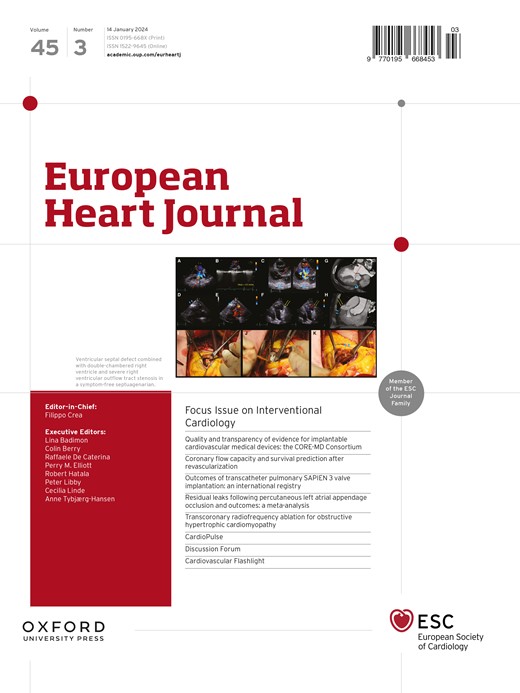Severity of pulmonary hypertension and pregnancy outcomes: newer insights from the M-PAC registry
IF 37.6
1区 医学
Q1 CARDIAC & CARDIOVASCULAR SYSTEMS
引用次数: 0
Abstract
Background Pregnancy outcomes in women with pulmonary hypertension remain suboptimal. Pregnant women with pulmonary hypertension (PH) are placed in the modified WHO category IV, regardless of the severity or etiology of PH. Earlier studies have indicated that pregnancy outcomes may differ based on the etiology, with more favourable outcomes observed with PH related to left to right shunts. However, it is possible that the pregnancy outcomes may vary based on the severity of PH also. Purpose To analyse pregnancy outcomes in women with PH and investigate differences based on disease severity. Methods M-PAC Registry, is a single center prospective study of pregnancies in women with heart diseases, conducted between July 2016 and December 2019 in a low-and middle-income country from South Asia, whose methodology and outcomes have been published(1). The current study analysed pregnancies with PH enrolled in the M-PAC registry. The tricuspid regurgitation velocity obtained during transthoracic echocardiography, was used to estimate right ventricular systolic pressure (RVSP). Based on the estimated RVSP, PH was classified into three groups; mild (36-45 mm of Hg), moderate (46-64 mm of Hg) and severe (≥ 65 mm of Hg). The differences in the maternal and foetal outcomes among the groups were analysed. Results Of the 1029 pregnancies complicated by heart disease enrolled in the M-PAC registry, 352(34.2%)had PH. Among these 352 pregnancies, 186(52.8%) had mild, 73 (20.7%) had moderate and 93 (26.5%) had severe PH. Adverse maternal cardiac events occurred in 77 pregnancies (21.8%), with heart failure in 53(15.1%) and mortality in 10(2.8%). The composite adverse foetal event rate was 38.6%, foetal loss at 9.7%, low birth weight at 28.9%, and preterm labour at 7.1%. The mean (±standard deviation) RVSP was higher in pregnancies with adverse maternal outcome (58.81±16.9 vs 51.16±15.9; P < 0.001) or adverse foetal outcome (58.10±17.3 vs 49.52±14.9; P < 0.001)compared to those without. When comparing the three groups, pregnancies with mild PH exhibited significantly lower rates of adverse maternal and fetal events compared to those with severe and moderate PH (Fig-1 and Table-1). Mild PH was associated with outcomes similar to those without PH in the M-PAC registry. Conclusion The severity of PH significantly correlated with the adverse pregnancy outcomes. Women with mild PH tend to experience pregnancy outcomes comparable to those without PH, suggesting that pregnancy should not be deemed contraindicated in this subgroup. Therefore, re-evaluation of the placement of PH within the modified World Health Organization (mWHO) classification is warranted, considering the severity of PH.Figure 1:Pregnancy Outcomes & PH SeverityTable-1 PH Severity & Pregnacny Outcomes肺动脉高压的严重程度与妊娠结局:来自 M-PAC 登记处的最新见解
背景患有肺动脉高压的妇女的妊娠结局仍不理想。无论肺动脉高压的严重程度或病因如何,患有肺动脉高压(PH)的孕妇都被归入修改后的 WHO IV 类。早期的研究表明,不同病因导致的妊娠结局可能不同,与左向右分流有关的 PH 患者妊娠结局更佳。然而,妊娠结局也可能因 PH 的严重程度而异。目的 分析 PH 妇女的妊娠结局,并研究疾病严重程度的差异。方法 M-PAC Registry 是一项针对心脏病女性妊娠的单中心前瞻性研究,于 2016 年 7 月至 2019 年 12 月期间在南亚的一个中低收入国家进行,其研究方法和结果已发表(1)。本研究分析了在M-PAC登记处登记的患有PH的孕妇。经胸超声心动图检查获得的三尖瓣反流速度用于估算右心室收缩压(RVSP)。根据估计的 RVSP,PH 被分为三组:轻度(36-45 毫米汞柱)、中度(46-64 毫米汞柱)和重度(≥ 65 毫米汞柱)。分析了各组间产妇和胎儿结局的差异。结果 在 M-PAC 登记的 1029 例合并心脏病的孕妇中,有 352 例(34.2%)患有 PH。在这 352 例妊娠中,186 例(52.8%)为轻度 PH,73 例(20.7%)为中度 PH,93 例(26.5%)为重度 PH。77名孕妇(21.8%)发生了不良母体心脏事件,其中53名孕妇(15.1%)出现心力衰竭,10名孕妇(2.8%)死亡。胎儿综合不良事件发生率为 38.6%,胎儿夭折率为 9.7%,出生体重不足率为 28.9%,早产率为 7.1%。与无不良孕产结局的孕妇相比,有不良孕产结局(58.81±16.9 vs 51.16±15.9;P&;lt; 0.001)或不良胎儿结局(58.10±17.3 vs 49.52±14.9;P&;lt; 0.001)的孕妇的平均(±标准差)RVSP更高。比较三组孕妇,轻度 PH 孕妇的不良母体和胎儿事件发生率明显低于重度和中度 PH 孕妇(图 1 和表 1)。在 M-PAC 登记中,轻度 PH 与无 PH 孕妇的结局相似。结论 PH 的严重程度与不良妊娠结局密切相关。轻度 PH 妇女的妊娠结局往往与无 PH 妇女的妊娠结局相似,这表明该亚组妇女不应被视为妊娠禁忌症。因此,考虑到 PH 的严重程度,有必要重新评估 PH 在修改后的世界卫生组织(mWHO)分类中的位置。
本文章由计算机程序翻译,如有差异,请以英文原文为准。
求助全文
约1分钟内获得全文
求助全文
来源期刊

European Heart Journal
医学-心血管系统
CiteScore
39.30
自引率
6.90%
发文量
3942
审稿时长
1 months
期刊介绍:
The European Heart Journal is a renowned international journal that focuses on cardiovascular medicine. It is published weekly and is the official journal of the European Society of Cardiology. This peer-reviewed journal is committed to publishing high-quality clinical and scientific material pertaining to all aspects of cardiovascular medicine. It covers a diverse range of topics including research findings, technical evaluations, and reviews. Moreover, the journal serves as a platform for the exchange of information and discussions on various aspects of cardiovascular medicine, including educational matters.
In addition to original papers on cardiovascular medicine and surgery, the European Heart Journal also presents reviews, clinical perspectives, ESC Guidelines, and editorial articles that highlight recent advancements in cardiology. Additionally, the journal actively encourages readers to share their thoughts and opinions through correspondence.
 求助内容:
求助内容: 应助结果提醒方式:
应助结果提醒方式:


